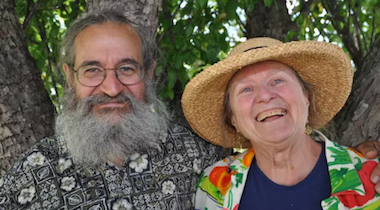Meet the little shareholders taking on Warren Buffett

Financial Times, April 27, 2017
By Stephen Foley
Meet the little shareholders taking on Warren Buffett: a psychotherapist, a peace campaigner and two retired executives from a food co-operative.
They are demanding, variously, that Mr Buffett’s Berkshire Hathaway disclose more information about its political donations, curb its greenhouse gas emissions and divest its investments in fossil fuel companies.
Mr Buffett, the famed Oracle of Omaha, opposes them all, but their proposals will go to a vote at Berkshire’s annual meeting on May 6 and the dissidents still hope to sway him — and get him to use his public profile to advance their causes.
“Tom and I are from Iowa, across the river from Omaha, so we have deep roots there and our belief has always been that Berkshire is a step above other companies,” said Mary Durfee, who has lodged a shareholder proposal jointly with her husband, Tom Beers.
The couple, who used to work as executives at a co-operative food wholesaler, want Berkshire to report on all the political donations made by the company and its sprawling group of subsidiaries, both directly and through politically-active trade associations.
Similar demands are being made at dozens of US shareholder meetings this year, thanks to groups such as Clean Yield Asset Management, which runs the couple’s portfolio of investments.
Mr Beers says they agreed to put their names to the resolution because of concerns about how the Supreme Court’s Citizens United decision unleashed a flood of corporate spending on US election campaigns.
“It is important that shareholders know how their money is being spent, what companies are doing in terms of public policy and in terms of elections, and who they are supporting or not supporting,” he said.
Berkshire’s board, led by Mr Buffett, unanimously opposed the proposal, saying getting all the subsidiaries to report this information up to head office would be too onerous, and in any case all its companies comply with legal disclosure rules.
It made a similar argument in opposing a proposal that Berkshire should report on how methane is stored and transported at its Northern Natural Gas Company subsidiary, and to introduce policies to cut methane production, saying it already takes part in safety programmes run by the Environmental Protection Agency.
Marcia Sage, a psychotherapist and social worker from Greenwich, Connecticut, who has $5,000 of Berkshire shares, put her name to a proposal for a methane safety report.
It will be presented at the annual meeting by a representative of Baldwin Brothers, the campaigning asset management group where her son Dylan works.
She has been concerned about the dangers of methane, Ms Sage says, since hearing about the environmental and health effects of a massive methane leak in California in 2015. She had never sponsored a shareholder proposal before this year.
“And I hadn’t climbed any large trees, either,” she said. “Because it is Buffett, and he has a louder voice than others, it would be great if he spoke up. This is my tiny little statement. I am going to do this again. It is exciting. And it is extremely important.”
Independent shareholder proposals do not have a record of success at Berkshire, where Mr Buffett personally controls around one-third of the votes. For example, a 2014 proposal that Berkshire should consider paying a dividend, lodged by an Ohio tax adviser with an $8,000 shareholding, won just 2 per cent of the vote.
Last year, a resolution that Berkshire should produce a report on the dangers of climate change to its business attracted only 11 per cent support. However, its sponsor, the Nebraska Peace Foundation, is back this year, with a proposal that Mr Buffett should divest Berkshire’s share portfolio of holdings in fossil fuel companies such as the oil refiner Phillips 66.
The Nebraska Peace Foundation‘s president, Loyal Park, has been involved with the organisation since its beginnings as an anti-Vietnam war movement in the state capital, Lincoln, while its activities have widened into issues of equality and protecting the environment.
“We consider Berkshire to be local, with Warren Buffett living and having his headquarters in Omaha, less than 60 miles away,” Mr Park said. “We wanted to invest the money that the foundation has in a socially responsible way and our choice of purchasing one share of Berkshire was done with the idea that we might have some effect bringing our ideas before Warren and the shareholders.”
The Berkshire board’s opposition to divestment from fossil fuels — even over the 12-year horizon allowed by the foundation’s resolution — was unanimous, according to the company’s regulatory filing.
“Berkshire should not limit its universe of potential investments based on complex social and moral issues,” it said.
Yet these are the complex social and moral issues that will be debated when more than 30,000 Berkshire shareholders congregate in Omaha for what has been dubbed the “Woodstock of capitalism”.
Mr Buffett has allowed up to an hour for the discussion, which will come at the end of a day-long shareholder question-and-answer session with him and Charlie Munger, Berkshire’s vice-chairman.
None of the shareholders themselves will be travelling to Omaha for the event, preferring to let advocates present their proposals, but they all hold out hope, if not for a majority vote, at least for a sympathetic hearing.
“You have got to start somewhere,” Ms Durfee said of her foray into shareholder activism. “And we believe Warren Buffett pays attention.”
Back